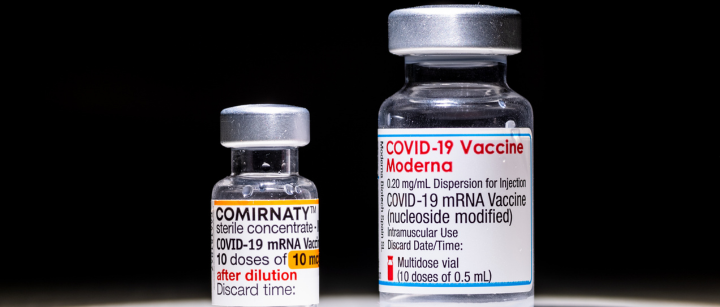CDC Vaccine Panel Presentation Distorts Research on Safety of mRNA COVID-19 Vaccines

A presentation by scientists on a work group for the Centers for Disease Control and Prevention’s (CDC) vaccine advisory panel highlighted various alleged “safety uncertainties” of the mRNA COVID-19 vaccines, including concerns about cancer and changes to the immune system. However, many scientists have told us that numerous cited studies are either misconstrued or of poor quality.
As with all medical products, the mRNA COVID-19 vaccines are not 100% safe. The vast majority of people experience only temporary and mild side effects, which are expected. Serious side effects can occur but are rare.
## ACIP Meeting and Vaccine Recommendations
At its September 19 meeting, the Advisory Committee on Immunization Practices (ACIP) ultimately voted to recommend the COVID-19 vaccines for all individuals aged 6 months and older, provided the decision is discussed with a healthcare provider. However, the group nearly voted to require everyone to get a prescription for the shots and also endorsed unfounded or misleading claims about the risks of the vaccines.
In an unprecedented move, Health and Human Services Secretary Robert F. Kennedy Jr., who previously led an anti-vaccine organization, replaced the panel and installed new members. Many of these new members lack expertise in vaccines or have spread inaccurate vaccine information.
## Presentation by New Vaccine Work Group
During the meeting, Dr. Wafik El-Deiry, director of Brown University’s cancer center, and Charlotte Kuperwasser, a breast cancer biologist at Tufts University, presented as members of a newly reconstituted COVID-19 vaccine work group (neither are ACIP members). Their presentation focused on several technical and theoretical alleged safety concerns of the vaccines.
Scientists have told us that these concerns are based on misinterpretations of studies or flawed science and were presented without proper context.
Marc Veldhoen, an immunologist at the Gulbenkian Institute for Molecular Medicine in Portugal, described the presentation as an example of anti-science ideology where facts and data are cherry-picked or misinterpreted to fit a predetermined narrative.
While many of the alleged “safety uncertainties” — such as claims about DNA contamination and cancer — have circulated on social media for years, this was the first time they gained legitimacy at an ACIP meeting.
Since the meeting, unfounded claims about COVID-19 vaccine safety have continued to spread online.
In a commentary published in *Vaccine*, former ACIP members criticized the meeting’s process, content, and outcome, noting an inappropriate focus on theoretical harms using low-quality data and that standard methodological practices were not followed.
## Changes to the Vaccine Work Group and CDC Involvement
According to the CDC, work groups “review relevant published and unpublished data and develop recommendation options for presentation” to ACIP. These groups must include at least two ACIP members and typically involve CDC government members as well as outside experts and medical group liaisons.
Under Kennedy, CDC involvement in the group has declined, and liaisons have been barred. One former CDC lead for the COVID-19 vaccine work group resigned in May following changes made by Kennedy.
In a lawsuit updated on November 5, the American Academy of Pediatrics, the American College of Physicians, and the Infectious Diseases Society of America, among others, called for the court to dissolve the current ACIP panel and void its decisions. The complaint cited “material inaccuracies,” including an allegation of COVID-19 vaccine DNA contamination presented by the new work group.
## Responses from Presenters and Scientists
We sent questions to El-Deiry and Kuperwasser regarding scientists’ concerns about their presentation. Kuperwasser responded with detailed answers, defending the presentation and acknowledging disagreement among scientists. She emphasized there are “gaps in knowledge that need to be addressed” and that numerous publications support her claims.
On November 5, Kuperwasser republished some of the same statements in a piece about COVID-19 vaccination and cancer for the Brownstone Institute, a think tank known for opposing COVID-19 restrictions.
—
### Claims of ‘Impurities’ Based on Flawed Analyses
Much of the presentation focused on alleged safety issues, including cancer, stemming from leftover DNA in the mRNA vaccines. As previously explained, a small amount of residual DNA is normal and expected in these vaccines, with no evidence it causes cancer.
Some reports claiming excessive DNA in vaccines have been disputed by scientists, who questioned the measurement methods used. Other vaccines produced using cells can also contain low levels of residual DNA.
The presenters cited eight references reporting “DNA impurities” in vaccines. Many of these have not been peer-reviewed or were published in journals not indexed on PubMed, which is a minimal requirement for scientific reliability. One citation was testimony given before a state legislature rather than a scientific paper.
One credible reference, a paper published in *Vaccine* in March 2025, specifically debunks a cited paper alleging DNA contamination, detailing why that study overestimated DNA amounts. Journal editors issued an expression of concern about the criticized paper in June, which the presenters did not mention.
The presentation heavily relied on a September 6 paper from the journal *Autoimmunity* claiming DNA levels in vaccines exceed regulatory limits by 36 to 627 times. This paper, co-written by an individual with a history of spreading vaccine misinformation, is described by its authors as “an expanded version of a previous preprint” that has been criticized by other scientists and is currently under investigation.
This *Autoimmunity* study used fluorescent dye-based measurement methods that regulatory agencies do not consider reliable for assessing residual DNA. The presence of high amounts of mRNA and lipids in vaccine samples can lead to falsely elevated DNA readings if samples are not prepared correctly.
Rolf Marschalek, a molecular biologist at Goethe University Frankfurt and senior author of the *Vaccine* paper, said in an email that these studies “do not allow correct measurement” of DNA and that the *Autoimmunity* paper should not have been published.
An unpublished paper under review at *npj Vaccines,* from the Slovak Academy of Sciences, used four different methods to measure DNA levels in mRNA vaccines. Their results showed that residual DNA is below approved limits, present in very low quantities relative to mRNA, and degraded into small fragments.
Kuperwasser stated that residual DNA impurities in mRNA vaccines remain a concern and emphasized that no studies have definitively shown these impurities to be harmless or unable to enter cells, integrate into DNA, or cause adverse effects.
Regulatory agencies worldwide maintain that concerns about DNA contamination in mRNA vaccines are misplaced. Testing with established methods has not revealed concerning DNA levels. The idea that residual DNA poses a risk is theoretical and highly unlikely due to multiple biological protections that prevent foreign DNA from altering cellular DNA or causing harm.
The Annenberg Public Policy Center at the University of Pennsylvania and the Vaccine Education Center at the Children’s Hospital of Philadelphia produced a video explaining how cells defend against foreign DNA fragments.
Veldhoen remarked, “These vaccines have undergone extensive testing, and the results clearly demonstrate their safety and efficacy, with minimal risk of side effects. This evidence remains robust and will not change retrospectively.”
Researchers at the Paul Ehrlich Institute in Germany noted that discussing potential risks of new technologies is important but must be based on solid data adhering to good scientific practices.
—
### IgG4 Antibodies and Immune System Concerns
The presenters cited a 2022 *Science Immunology* paper from Germany to suggest that COVID-19 vaccines could cause concerning immune system changes.
The paper found that repeated mRNA COVID-19 vaccinations lead to increased levels of spike-specific IgG4 antibodies. Since IgG4 can, in some contexts, be less effective at fighting infection, this finding has been misinterpreted by misinformation sources to imply that vaccination weakens immunity or increases susceptibility to infections or cancer.
Scientists emphasize there is no clinical evidence that increased spike-specific IgG4 reduces vaccine effectiveness. COVID-19 vaccination continues to protect against severe disease.
Dr. Kilian Schober, an immunologist and co-senior author of the paper, stated that the findings do not raise safety concerns and describe IgG4 changes as an “interesting immunological observation.”
In contrast, during the presentation, the work group framed the IgG4 findings as a potential problem. Kuperwasser linked IgG4 increases to “reduced antibody effector function” and a potential role in “promoting tumor immune tolerance.”
El-Deiry attempted to connect IgG4 to cancer, citing a study of pancreatic cancer patients, and later emphasized this connection on social media. However, that study has methodological flaws and is inconsistent with other data showing no increase in cancer cases in South Korea, as explained by fact-checking organizations. The journal has issued a notice that the paper is under investigation.
Dr. Robert Malone, a prominent vaccine misinformation figure and Kennedy’s new panelist, has also characterized IgG4 findings as indicating immune suppression.
Experts say these interpretations are incorrect.
Dr. Shiv Pillai, an immunologist at Harvard Medical School, explained: “IgG4 is innocuous. In general, it is a ‘good thing’ and reduces inflammation and dampens allergic responses. It does NOT suppress the immune system.”
Though IgG4 can theoretically clear viruses slightly less efficiently, Pillai said there is no evidence this affects infections clinically. Other antibody types remain abundant and effective.
Veldhoen said IgG4 “interacts less aggressively with immune cells, leading to a more regulated, balanced response rather than immune suppression.” He added that spike-specific IgG4 antibodies retain neutralizing capacity, representing a refinement, not weakening, of immunity.
Schober noted that even if IgG4 partially lowers the coronavirus antiviral response, this might be beneficial by reducing the harmful overactivation sometimes seen with COVID-19. The key point is the positive clinical protection vaccination provides.
Schober also clarified that these IgG4 changes are specific to coronavirus spike antibodies and do not reflect broad immune suppression or increased cancer risk.
Veldhoen pointed out that elevated IgG4 in cancers likely results from chronic inflammation caused by the disease itself, not IgG4 causing cancer.
Pillai noted confusion even among physicians about IgG4, likely due to misunderstanding a rare autoimmune condition called IgG4-related disease, which involves IgG4 accumulation but is not caused by it.
Regarding the pancreatic cancer study, Veldhoen described it as having numerous limitations, including confounding factors and small sample sizes, which undermine its conclusions.
Thomas Winkler, geneticist and co-senior author of the *Science Immunology* paper, stated that IgG4-related disease is extremely rare and has not been observed to develop in the billions vaccinated with mRNA vaccines.
Kuperwasser acknowledged uncertainties about IgG4’s persistence and clinical significance, noting that excessive production can be associated, in some cases, with autoimmunity or immune fatigue depending on context.
—
### No Credible Link Between COVID-19 Vaccines and Cancer
The presenters also cited over 50 papers, including case reports, to argue that COVID-19 vaccines might cause cancer.
This claim has been repeatedly debunked. There is no credible evidence that COVID-19 vaccines cause cancer, lead to recurrence, or promote disease progression.
The National Cancer Institute states, “There is no evidence that COVID-19 vaccines cause cancer, lead to recurrence, or lead to disease progression.”
Veldhoen emphasized that many alarming claims rely on anecdotal case reports—the weakest form of scientific evidence—and that correlation does not imply causation.
Large epidemiological studies have not identified increases in cancer post-vaccination, nor is there a known mechanism for the vaccines to cause cancer.
Infections, which cause significant inflammation, have been shown to potentially awaken dormant cancer cells; vaccination induces only a brief, localized inflammatory response and is therefore far less likely to have this effect than infection.
A study published in *Nature* in October even suggested that COVID-19 vaccination may help certain cancer patients live longer by enhancing the efficacy of cancer immunotherapy.
—
### Frameshifting and Unintended Protein Production
The work group raised concerns about findings from a 2023 *Nature* paper that showed that due to modified mRNA in COVID-19 vaccines, cellular protein-making machinery occasionally “slips” while reading the RNA. This results in “frameshifting,” producing slightly altered spike proteins that the immune system can recognize.
Around one-third of vaccinated individuals generated these unintended proteins. However, over 90% of the time, the correct protein is produced, consistent with evidence showing vaccine effectiveness.
The *Nature* paper authors have repeatedly stated there is no evidence this frameshifting is harmful. They view their findings as important for designing future mRNA vaccines because the issue can be fixed but do not challenge the safety of current COVID-19 vaccines.
The study’s senior authors emphasized that “there is no evidence linking unintended proteins and immune responses with harm” and that their work should not affect the existing vaccines’ safety assessment.
Other experts agree with this interpretation.
Nonetheless, the work group highlighted the uncertainty around the immunogenic or toxic properties of these off-target proteins, stating their health consequences are “unknown” and “have not been studied.”
Dr. Retsef Levi, chair of the COVID-19 vaccine work group and ACIP member, cited the frameshifting findings in a slide titled, “mRNA Vaccines Don’t Work as Intended.”
Kuperwasser defended her interpretation, stating that neither the quantities of frameshifted proteins produced nor their cellular effects are known. She called assuming these proteins are safe “pure speculation” at this time.
Veldhoen noted that because the vaccine’s mRNA sequence is known, unintended proteins can be predicted and are not random or resembling self-proteins capable of triggering autoimmunity.
He explained that frameshifting produces a slightly shorter or minimally altered spike protein variant with minor differences unlikely to be harmful.
The *Nature* authors also highlighted that humans regularly encounter unintended proteins from food and gut bacteria, with immune responses controlled to prevent damage.
—
## Conclusion
Claims presented at the recent CDC vaccine advisory panel meeting about mRNA COVID-19 vaccine safety issues, particularly relating to DNA contamination, immune system changes, and cancer risks, rely on misinterpreted or low-quality science.
Extensive research and regulatory evaluations have consistently demonstrated that mRNA COVID-19 vaccines are safe and effective, with serious side effects being rare.
Ongoing monitoring continues to support public health recommendations for COVID-19 vaccination as a critical tool in controlling the pandemic.
https://www.factcheck.org/2025/11/cdc-vaccine-panel-presentation-distorts-research-on-safety-of-mrna-covid-19-vaccines/







